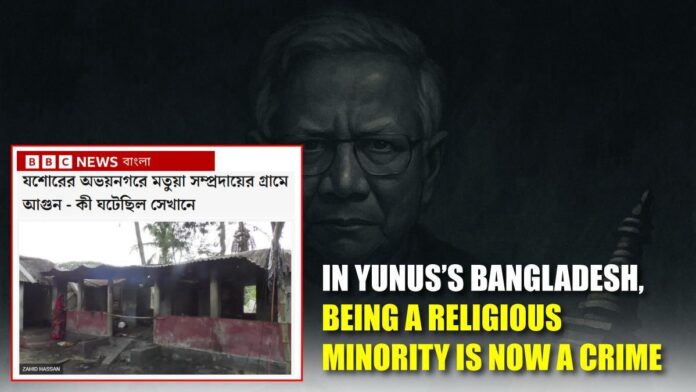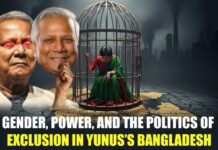In Daharamsiyahati village of Abhaynagar, Jessore, something unspeakable happened. But let’s be clear — this wasn’t a “clash,” it wasn’t a “riot,” it wasn’t “unrest.” What happened was a coordinated act of ethnic cleansing. Human beings were burned, homes reduced to ash, and demons desecrated temples — all under the watch of a man named Mohammad Yunus, who now stands accused of orchestrating the most shameful political charade in Bangladesh’s history.
This isn’t politics anymore. This is annihilation.
At the center of this tragedy? A fish pond. Yes, a fish pond — the most trivial of property disputes, twisted into religious hatred, fueled by greed, power, and a system that wraps personal vendettas in the cloak of divine war. And while the Matua community was preparing for their sacred yajna — a peaceful annual ritual — machete-wielding mobs stormed in. They spared no one. Not homes. Not gods. Not women. Not children. Not the elderly.
- Eighteen homes were set ablaze.
- The fire burned for four hours.
- Authorities arrived after 11 PM.
This is not governance. This is state-sponsored abandonment. When the poor cry for help, Yunus’s state responds with silence — or worse, with complicity. Because this isn’t just neglect — it’s intentional cruelty.
The attackers looted jewelry and cash, ravaged memories, and left behind ruins. But the government’s response? A mockery:
➡️ 16 pieces of tin.
➡️ 30 kg of rice.
➡️ A 6,000 taka check.
Do they think a home is just a roof? That lives, memories, family deities, and sacred rituals can be compensated with charity? This is not aid — it’s insult added to injury.
Even more chilling — the mob didn’t let the police or fire service through. The state had to call in the army. What clearer sign could there be that this country, under Yunus, is a republic of thugs?
The murder of Tarikul Islam Sardar, a local BNP leader, is real. But using that as an excuse to torch an entire minority village? That’s not justice — that’s pogrom politics. That’s the signature move of a regime where minorities are branded as enemies, where citizenship is conditional on belief, where existence itself becomes a punishable offense.
In Yunus’s Bangladesh, minorities are second-class citizens. That’s why they’re targeted again and again — during Durga Puja, Janmashtami, and now, a yajna. To the Yunus regime, religious practice by minorities is a provocation — their very presence a threat.
The Matuas have lived here for generations. This soil is theirs — they know its scent, its history, its gods. And yet, in one night, they became refugees in their own land, exiled by fire and fear.
The truth is bitter but simple: Under Yunus and his circle, the life of a religious minority means perpetual agony — a wound constantly salted by injustice. Their governance means fear. Their justice is hypocrisy. Their democracy, a beautiful lie.
Today, minorities in this country are just “targets,” “victims,” and “statistics.” Their screams are headlines for one day, forgotten the next. But silence has a limit. One day, the fire lit by this regime will engulf its architects. One day, the victims will become the fury that breaks the lie.
This article is not meant to comfort — it is meant to confront. To strip away the mask of civility and show the rot beneath. What happened in Abhaynagar is an unforgivable crime. And the blame lies squarely at the feet of Mohammad Yunus and his gangster-administration, which has turned governance into predation.
Let this brutal act of violence against minorities stand as the symbol of this regime — a regime that knows neither humanity, nor justice, nor peace. Only fire. Only hatred. Only blood.




